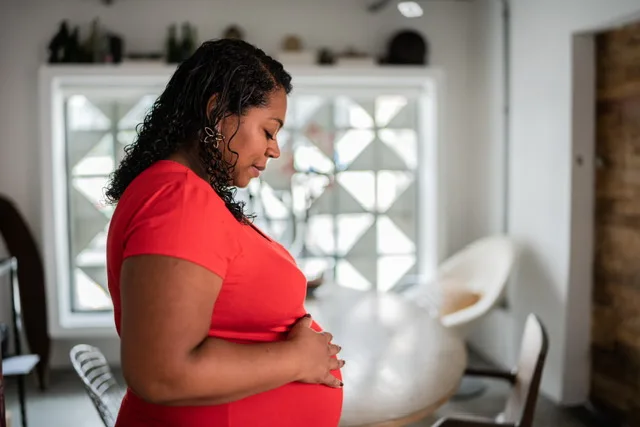
Photo courtesy of GettyImages
Since Detroit-based doula Khalifah Green started working with clients covered by Medicaid, she’s met expectant parents who once believed doula care was out of reach.
“The families that have come to me never thought that this was possible for them. They didn’t even know what a doula was,” said Green, who predominantly works with families of color. “To be honest, some people say, ‘I thought that was for rich white people.’”
Green is a full-spectrum doula, which means she supports birthing parents and their families during all stages of the prenatal and childbirth process. Through her work at Womb Wise Co., she meets with clients during pregnancy, attends their births at local hospitals, and stays in touch during those critical postpartum months, when extra support becomes vital for families adjusting to life with a new baby.
Doulas are trained birth professionals who differ from midwives, in that they do not provide medical care. Instead, they offer education, emotional and physical support, and advocacy for patients during the prenatal, birth, and postpartum process. Doulas might help birthing partners explore massage techniques to relieve pain during labor, address breastfeeding challenges, or communicate desired labor plans to doctors during the childbirth process.
Green said clients have even invited her to their babies’ first birthday parties. “Some women who are normally alone—who would not have had anyone in this position—they have me. So I try to support them as best I can.”

Detroit doula Khalifah Green helps an expectant mother relieve pain during labor.
Khalifah Green/Contributed
Medicaid-covered doulas bridge gap between Black patients and providers
Thanks to the priorities of state and federal leaders, people from low-income and historically marginalized communities in Michigan are able to connect with doulas like Green.
Last year, Michigan’s government expanded Medicaid coverage to include reimbursement for doula care. In conjunction with Gov. Gretchen Whitmer’s 2022 “Healthy Moms, Healthy Babies” program, the Michigan Department of Health and Human Services (MDHHS) launched its Doula Initiative to connect Medicaid-covered families with eligible providers, provide support and training resources to doulas themselves, and create a strong statewide network of doulas.
Today, Medicaid reimburses up to six doula visits during the prenatal and postpartum periods, at a rate of $75 per visit. It also covers labor and delivery support in a Michigan hospital, at a rate of $700.
In predominantly Black communities like the City of Detroit, where Black children make up some 75% of new babies born each year, this expanded doula coverage helps bridge the gap between families and medical systems that have so often made them feel excluded—sometimes with deadly consequences.
Green points to this distrust between health care providers and Black patients as a particularly dangerous reality in Michigan, explaining that continued Medicaid coverage for doula access is especially important “given the historical and ongoing trauma faced specifically by Black individuals in the healthcare setting.”
“Too often, there are these tragic stories about families losing a loved one in pregnancy, in labor, in postpartum, and many of them are preventable. And so I can’t help but imagine also if there was a doula there, maybe we could have advocated. Maybe we could have empowered, educated,” she said.
She recalls a recent client who was struggling during unmedicated labor at the hospital. Green suggested flipping the mother to her side in an effort to work the baby down the birth canal. At first, the doctor and nurse disregarded her suggestion, instead trying to pull the patient’s legs apart and force them into stirrups.
Green immediately recognized potential signs of a trauma response in the patient. “She is literally concrete. Her legs are stiff and she will not move,” she recalled. “I said, ‘This is not working.’ And the doctor stopped and looked at me and said, ‘You know what? You’re right.’”
The patient went on to successfully deliver her baby in a position that was more comfortable and allowed her to feel “empowered,” Green said—an outcome that might not have been possible without Green’s keen eye and advocacy in an overwhelming environment. “And in that moment, I’m the only person in that room that looks like her.”
Addressing the Black maternal health crisis
Green’s concerns about Black maternal health outcomes aren’t just anecdotal.
Dawn Shanafelt is the Director of the Maternal & Infant Health Division at the MDHHS. She said that from 2016 to 2020, Black women in Michigan were 2.2 times more likely to die from pregnancy-related causes than their white counterparts. “We see these statistics not only in Michigan but nationally,” she said. “There is a Black maternal health crisis in our country.”
According to the CDC, Black women in the United States are three times more likely than white women to die from pregnancy-related complications. These disparities are tied to a number of complex systemic and socioeconomic factors, from structural barriers in the healthcare space to increased rates of certain chronic conditions.
Even without consideration for race, the general maternal mortality rate in the US is troubling. CDC data shows that in 2020, the US had a rate of 23.8 maternal deaths per 100,000 live births. A report from The Century Foundation highlights that staggering maternal mortality is “not the case in similar countries, and is far from an inevitability. The United States continues to be an outlier among industrialized nations, with a maternal mortality rate several times higher than other high-income countries.”
Doula access matters—even after a healthy birth
But the statistics also support the positive impacts of doula access. A study from the University of Minnesota School of Public Health showed that women who received doula care were 22% less likely to experience preterm birth, and had lower incidences of cesarean births (C-sections).
Shanafelt said that since the onset of Michigan’s Doula Initiative, 327 doulas have registered through a searchable state database. Of those, 209 accept Medicaid.
“Medicaid’s definitely really critical, particularly given that Medicaid covers 40% or higher of the births in our state,” she said. “Michigan’s definitely on the forefront of that by having the ability to reimburse for doula services.”
Patients using the free database can search by county and sort results based on whether their intended doula is covered by Medicaid benefits—like Green is—then directly access contact information.
“Prior to Medicaid covering doulas, the only way to get a doula was to pay for a doula with cash or maybe be involved with a program where doulas had grants, so their time was covered through a grant program,” Shanafelt said. “That’s really hard—to find a doula who’s covered by a grant program.”
The expansion to include doula access comes on the heels of expanded postpartum care for Medicaid recipients in Michigan, who are now covered for a full year of postpartum benefits with support from an earlier phase of the “Healthy Moms, Healthy Babies” initiative. Michigan opted in to the extended postpartum coverage that was offered to states under President Joe Biden’s American Rescue Plan Act (ARPA).
Shanafelt said that due to the expansion, close to 45,000 Michiganders now have access to Medicaid coverage. This allows providers—including doulas—to monitor new parents and infants during the critical “fourth trimester.”
“That first 42 days, particularly after birth, can be a time when health challenges can arise, when chronic health conditions that were maybe present before or started to occur during pregnancy, they’re still there and they need to be monitored and assessed,” she said. “Postpartum people need to be supported if they need ongoing behavioral health or mental health support. So that’s really, really important. That 12 months following pregnancy is the time when we want support.”
Michigan doulas like Green play a role in this critical postpartum care, offering support through covered doula visits on top of appointments with traditional health care providers.
“A lot of times people just ghost us in the postpartum period. And I think they’re just hiding out because they’re cocooning, because they don’t know what to do,” Green said.
Before expanded doula and postpartum coverage under Medicaid, she said, some new parents slipped through the cracks. “There’s no nutritional support, there’s no education, there’s nobody telling these people to sit down, it’s okay to relax, you deserve rest.”
Doulas are part of a “holistic approach” to care
Shanafelt said that there’s still work to be done in bridging the gap in awareness between the general public and even health care providers about the benefits of doula care, particularly for non-white patients.
“I think what we’re in the midst of right now is essentially a culture shift—a shift to a broader team to provide support, advocacy, and care for people during that critical time during pregnancy and postpartum,” she said.
Shanafelt said doulas are not intended to “shoulder the burden of improving maternal and infant health” in Michigan, but instead should be considered part of a well-rounded toolkit for improving Black maternal health outcomes in the state.
“Having a holistic approach, an enhanced care team really does benefit families and it benefits clinicians, right? By having a doula there for their patients, that’s an amazing asset,” she said. “I think that there are still gaps in knowledge. Change takes time.”
Republican threats to Medicaid put doula access at risk
Green and Shanafelt both worry about the potentially devastating consequences for clients should Medicaid benefits crumble. Presumptive Republican presidential nominee Donald Trump has repeatedly vowed to reduce federal funding for Medicaid and cut back on enrollment in the program, a move that Green says could have a devastating impact on the communities she works with and expectant parents in general.
“I think that if they slash Medicaid, it would just be detrimental to society as a whole because everybody is impacted, not just people on Medicaid,” she said. “If it is just people on Medicaid, then private insurance is going to follow.”
Shanafelt echoed Green’s sentiments.
“It is really, really important that everyone understands the challenges that are facing Black women,” she said. “Every person in Michigan or in the nation should have access to optimal health and shouldn’t have systemic barriers placed upon them.”

Trump administration revokes guidance requiring hospitals to provide emergency abortions
WASHINGTON (AP) — The Trump administration announced on Tuesday that it would revoke guidance to the nation's hospitals that directed them to...

Judge overturns Michigan’s 24-hour waiting period before an abortion
DETROIT—A judge on Tuesday struck down Michigan's 24-hour waiting period before an abortion, saying it conflicts with a voter-approved amendment...

House GOP fast-tracks budget bill that would cut off Medicaid funding to Planned Parenthood
The budget package proposes steep health care cuts—and includes a new push to block patients from accessing reproductive care. In a 30-24 party-line...

New Michigan law is a ray of sunlight amidst Trump’s attacks on reproductive rights
For nearly 40 years, a state law outlawed Michigan families from expanding their families through surrogacy—until now. Despite calling himself the...

Jocelyn Benson says miscarriage prompted her to prioritize reproductive health access
LANSING—Ahead of a nationally watched bid to become Michigan's next governor, Democrat Jocelyn Benson is releasing a memoir this month that includes...







